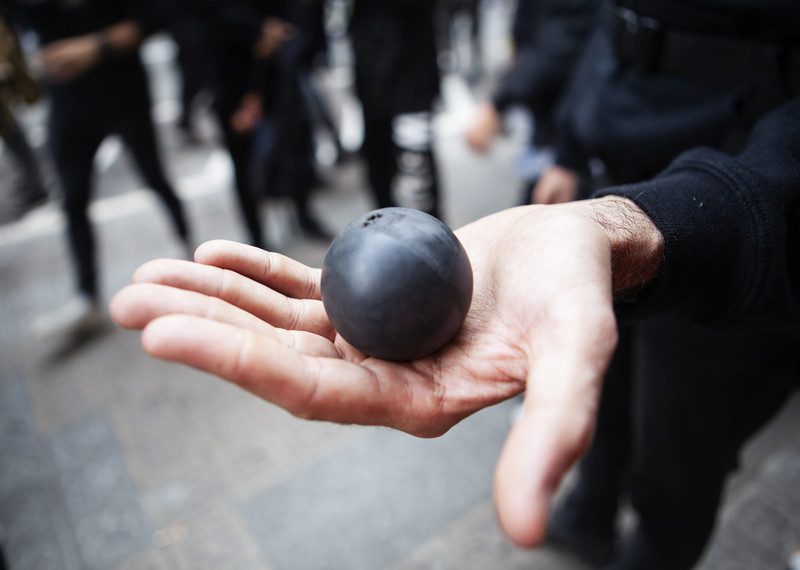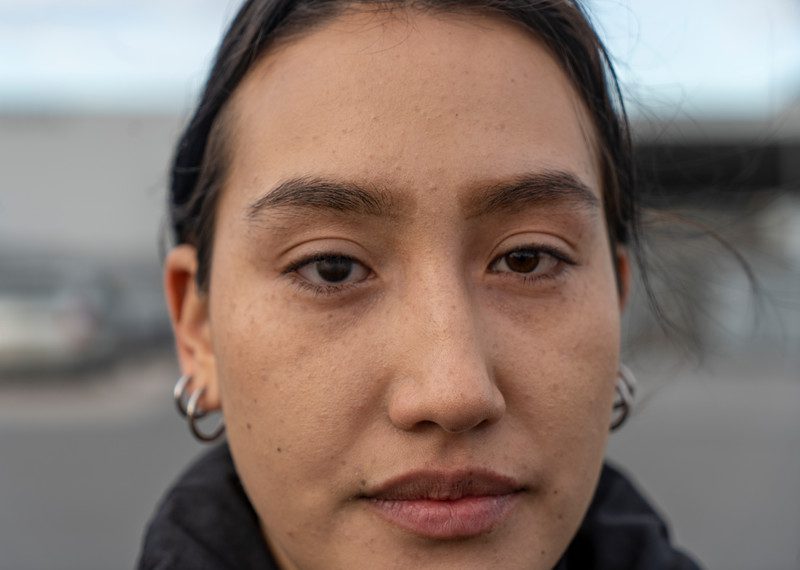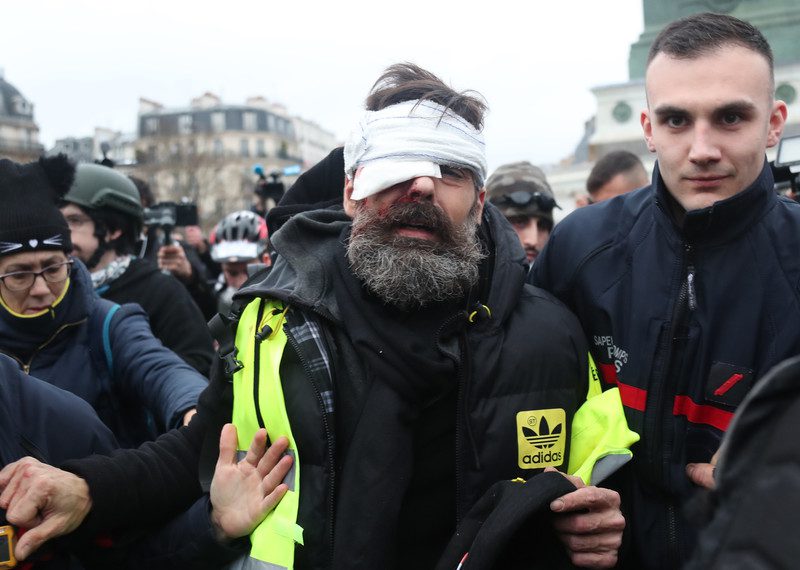- Police misuse of rubber bullets and other less lethal weapons against peaceful protesters is increasingly routine, leading to more injuries and deaths, a new report shows
- Increasing availability of rubber bullets and other less lethal weapons has led to a rise in the use of force against protesters, resulting in a huge increase in permanent injuries
- A global Torture-Free Trade Treaty is urgently needed to regulate the trade in policing equipment, and to help protect the right to protest
Security forces across the world are routinely misusing rubber bullets, plastic bullets and other law enforcement weapons to violently suppress peaceful protests and cause horrific injuries and deaths, said Amnesty International today, in a new report calling for strict controls on their use and a global treaty to regulate their trade.
The report, My Eye Exploded, published jointly with the Omega Research Foundation, is based on research in more than 30 countries over the last five years. It documents how thousands of protesters and bystanders have been maimed and dozens killed by the often reckless and disproportionate use of less lethal law enforcement weaponry, including kinetic impact projectiles (KIPs), such as rubber bullets, as well as the firing of rubberized buckshot, and tear gas grenades aimed and fired directly at demonstrators.
“We believe that legally-binding global controls on the manufacture and trade in less lethal weapons, including KIPs, along with effective guidelines on the use of force are urgently needed to combat an escalating cycle of abuses,” said Patrick Wilcken, Amnesty International’s Researcher on Military, Security and Policing issues.
Amnesty International and the Omega Research Foundation are among 30 organizations calling for a UN-backed Torture-Free Trade Treaty to prohibit the manufacture and trade of inherently abusive KIPs and other law enforcement weapons, and to introduce human rights-based trade controls on the supply of other law enforcement equipment, including rubber and plastic bullets.
“A Torture-Free Trade Treaty would prohibit all production and trade in existing inherently abusive law enforcement weapons and equipment, including intrinsically dangerous or inaccurate single KIPs, rubber-coated metal bullets, rubberized buckshot and ammunition with multiple projectiles that have resulted in blinding, other serious injuries and deaths across the world,” said Dr Michael Crowley, Research Associate at the Omega Research Foundation.
We believe that legally-binding global controls on the manufacture and trade in less lethal weapons, including KIPs, along with effective guidelines on the use of force are urgently needed to combat an escalating cycle of abuses.
Patrick Wilcken, Amnesty International’s Researcher on Military, Security and Policing issues
Misuse of less lethal weapons is causing devastating injuries worldwide
The weapons have led to permanent disability in hundreds of cases and many deaths. There has been an alarming increase in eye injuries, including eyeball ruptures, retinal detachments and the complete loss of sight, as well as bone and skull fractures, brain injuries, the rupture of internal organs and haemorrhaging, punctured hearts and lungs from broken ribs, damage to genitalia, and psychological trauma.
According to an evaluation by Chile’s National Institute for Human Rights, police actions during protests which began in October 2019 resulted in more than 440 eye injuries, with over 30 cases of eye loss, or ocular rupture.
At least 53 people died from projectiles fired by security forces, according to a peer-reviewed study based on medical literature worldwide between 1990 and June 2017. It also concluded that 300 of the 1,984 people injured suffered permanent disability. The actual numbers are likely to be far higher.
Since then, the availability, variety and deployment of KIPs has escalated globally, furthering the militarization of protest policing.
The report finds that national guidance on the use of KIPs rarely meets international standards on the use of force, which state that their deployment be limited to situations of last resort when violent individuals pose an imminent threat of harm to persons. Police forces routinely flout regulations with impunity.

In April 2021, Leidy Cadena Torres, then 22, was walking to a protest over tax reforms in the Colombian capital Bogota, when she was hit in the face by a rubber bullet fired from close range by a riot police officer. She lost an eye.
“I didn’t understand what was happening so I took out my phone and took a picture of myself, but I couldn’t see it,” she told Amnesty International.
“They try to injure you in a visible way, such as losing an eye, in order to scare people, so they don’t go out [and protest].”
Leidy Cadena Torres’s experience of being blinded has been repeated with alarming regularity in similar circumstances in south and central American states, Europe, the Middle East, Africa, and the USA during recent and current protests.
They try to injure you in a visible way, such as losing an eye, in order to scare people, so they don’t go out [and protest].
Leidy Caneda Torres

Gustavo Gatica, a 22-year-old psychology student, was blinded in both eyes after being hit in the face by rubber-coated metal pellets fired by police during inequality protests in Chile’s capital Santiago on 8 November 2019. To date there has been no accountability.
He recently told Amnesty International: “I felt the water running from my eyes … but it was blood.” He hopes his injuries will inspire change, to stop this happening to others, saying: “I gave my eyes so people would wake up.”
I gave my eyes so people would wake up.
Gustavo Gatica, 22-year-old psychology student

In the USA the use of rubber bullets to suppress peaceful protest has become increasingly commonplace.
One demonstrator hit in the face in Minneapolis, Minnesota on 31 May 2020 told Amnesty International: “My eye exploded from the impact of the rubber bullet and my nose moved from where it should be to below the other eye. The first night I was in the hospital they gathered up the pieces of my eye and sewed it back together. Then they moved my nose back to where it should be and reshaped it. They put in a prosthetic eye – so I can only see out of my right eye now.”
In Spain, the use of large, inherently inaccurate tennis-ball-sized rubber KIPs has led to at last one death from head trauma and 24 serious injuries, including 11 cases of severe eye injury, according to Stop Balas de Goma, a campaign group. In France, a medical review of 21 patients with face and eye injuries caused by rubber bullets noted severe injuries including bone fragmentation, fractures and ruptures resulting in blindness.
Amnesty International has also documented cases of tear gas grenades being aimed and fired directly at individuals or crowds in Chile, Colombia, Ecuador, France, Gaza, Guinea, Hong Kong, Iran, Iraq, Peru, Sudan, Tunisia and Venezuela.
In Iraq, security forces deliberately targeted protesters with specialist grenades which are 10 times heavier than typical tear gas munitions, causing horrific injuries and at least two dozen deaths in 2019. In Tunisia, Haykal Rachdi, 21, died after he was hit in the head by a tear gas cannister in January 2021.
In Colombia security forces have deployed VENOM, a 30-tube grenade launcher, originally developed for the US Marine Corps, to launch volleys of tear gas grenades at protesters.
